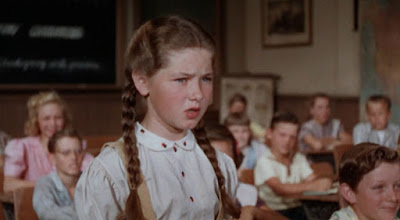I recently enjoyed watching a charming pair of family-friendly films newly released from Warner Archive. Banjo (1947) and Gypsy Colt (1954) both share charming pre-teen leads, stories of losing a beloved animal, and are packed full of clichés, though not to their detriment. Each film is charming and enjoyable in its own unique way.
Banjo is the name of Georgia farm girl Pat Warren's (Sharyn Moffett) dog. The pup is her constant companion and a great comfort to her since her mother's death. Her father has more difficulty adjusting to the loss. A drunken, reckless horse ride leads to his death.
Pat is sent to Boston so that she may live with her Aunt Elizabeth (Jacqueline White), who doesn't like dogs or the idea of suddenly having a child as her ward. She forces Banjo to stay confined in a small kennel. When he keeps escaping and causing trouble, she sends him back to the farm. Pat is heartbroken and determined to follow her dog back home.
The plot of Banjo is familiar, and you'll find no surprises as to what happens, but it is approached with a pleasing light humor, a cast of appealing actors and a script that stops just short of being too cute.
It's a shame that Sharyn Moffett didn't star in many films, because she has a refreshing, forthright air unusual for a child actress. In some moments, she made me think of a less mannered Margaret O'Brien. Unfortunately, the actress hit her stride as a lead just as she was entering into an awkward age for young performers in Hollywood. She was apparently not established enough to attempt the transition to teen and adult roles.
I liked the interactions between Pat and her friends, both on the farm and in Boston. The kids have a pleasant naturalness to them and the script gives them lots of quirky moments that make the story a bit more novel. I also liked that the kids in the Boston scenes were friendly, rather than falling into the old cliché of turning their noses up at the farm kid.
The script is by prolific screenwriter Lillie Hayward. This is one of the two films she produced. Director Richard Fleischer, the son of legendary animator Max Fleischer, does well with the material, adding suspense to a sequence that seems tacked on when the story resolves itself a bit too quickly. I found it amusing that the future helmsman of crime flicks like The Narrow Margin (1952) and Armored Car Robbery (1950) made such a tender story in his early career.
Gypsy Colt is in many ways a more substantial film, with a stronger sense of peril and more fully developed characters. The MGM drama features rosy-cheeked Donna Corcoran as 10-year-old farm girl Meg MacWade.
Each afternoon at three, Meg's horse Gypsy meets her at the schoolhouse so she can ride him home. Their bond is threatened when an extended famine forces her parents (Ward Bond and Frances Dee) to sell their horse to a wealthy racehorse enthusiast.
Gypsy continues to be devoted to Meg, escaping and returning home multiple times. This much to the anger of the harsh trainer (Lee Van Cleef) employed by the new owner to care for the horse. Van Cleef brings all his shifty-eyed Western villain sleaze to his role, playing it like a mustache twirling silent film cad.
While not overly sentimental, Gypsy Colt is a deeply heartwarming film. Bond and Dee are beautifully sympathetic to Meg's feelings for her horse. While they encourage her to be strong and accept the necessity of the situation, they never dismiss her pain. Bond is especially tender, approaching his daughter's problems with appealing gentleness and understanding.
Corcoran is another fine juvenile actress with an unfortunately brief film career. Given the right roles, she could have easily transitioned to an adult career. In a school room scene after Gypsy has been sold, Meg thinks she hears her horse whinny and starts to go to him. Her alarm in that moment, and the way she struggles to contain herself are remarkably nuanced. It's a wonderful bit of silent acting.
While Van Cleef's character is intentionally made to be a bit cartoonish, the characters are for the most part given a pleasing depth. They are allowed moral complexities which give them an unusually genuine feel.
Both films for the most part remain appropriate for family viewing. Parents may wish to discuss a few racial stereotypes regarding the farm staff and their children in the early scenes of Banjo. There's also an extended scene where Pat and her Boston friends engage in extremely dangerous play with a rifle. The horse in Gypsy Colt is whipped by the Van Cleef character briefly and more sensitive viewers may be disturbed by a scene where the horse collapses from exhaustion during an escape.
Many thanks to Warner Archive for providing a copy of the film for review. This is a Manufacture on Demand (MOD) DVD. To order, visit The Warner Archive Collection.

















